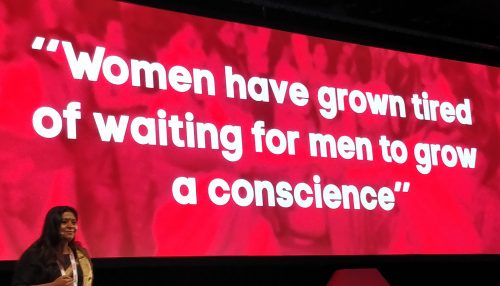‘We didn’t want to talk to women via kind men’ – FCB India’s Swati Bhattacharya
A campaign highlighting inclusiveness and reinventing a traditional festival was the driver of a push by The Times of India to boost its sales in India’s third-biggest city, Kolkata.
Speaking at Mumbrella360 in Sydney, FCB Ulka’s chief creative officer Swati Bhattacharya took the audience through the genesis of ‘No Conditions Apply’ a campaign for The Times of India Calcutta.
Apart from making a 400-year old ritual more inclusive, ‘No Conditions Apply’ pushed The Times of India to the leadership position in the Kolkata market and won several awards at festivals all over the world.


